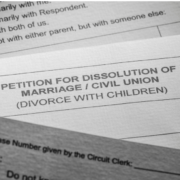How can you help your child navigate your divorce? Keep the focus and a close eye on them, agree to be civil and peaceful, and let them process the changes.
Working out a child custody agreement is one of the biggest priorities for divorcing couples with kids. Just because you and your spouse don’t want to remain married doesn’t mean you must give up parenting time and miss out on parental involvement as your children grow up.
However, you will need to avoid certain things that could affect the status of a child custody agreement. This will reduce the chances of you ending up in a custody battle later on because you chose not to play by the rules you helped establish.
Here are several examples of what not to do when it comes to child custody.
Criticizing Your Ex
As part of the child custody agreement you and your ex-spouse reached, you’ll likely have specific times throughout each week when you’ll have sole custody of your kids. If your divorce is still fresh on your mind, you might use this as an opportunity to tell your kids details about your divorce. You might also use it to criticize their other parent while in their presence.
Steer clear of doing these actions at all costs. Studies on children with divorced parents have shown that about one-third of them wish their parents wouldn’t criticize each other while they’re around. It can do a disservice to kids by making them feel like they’re stuck in the middle.
Even if you and your ex-spouse aren’t cordial in the aftermath of your divorce and continue to disagree over issues like child support, you shouldn’t let it show when you’re with your kids. Instead, keep the focus on them to take full advantage of your child custody setup.
Failing to Cooperate
If you’re constantly uncooperative while communicating with your spouse about child custody, it could create major problems. They may accuse you of being difficult and begin documenting all the instances in which you’ve given them a hard time. It could lead to a judge changing the terms of your original child custody agreement to minimize the contact you have with your ex-spouse and/or kids.
To keep your initial child custody agreement intact, stick to the child custody schedule that you agreed to and that a judge signed off on.
Being Inconsiderate
Are you always showing up late to pick up your kids or calling your ex-spouse at the last minute to let them know you can’t make it for a visit? Worse, do you take your children on vacation without letting your ex-spouse know or even just pick them up early from school on certain days without your ex-spouse’s permission?
All these actions are inconsiderate, to say the least. They are also reasons that a judge might cite for needing to make adjustments to your current child custody schedule.
Need Help With a Child Custody Case? Let Karen Ann Ulmer, P.C., Lend a Hand
Divorce cases that involve child custody can be more complex than other divorce cases. Karen Ann Ulmer, P.C., can provide the legal representation you need to navigate your way through a complicated case. Call (866) 311-4783 now to arrange a consultation.






